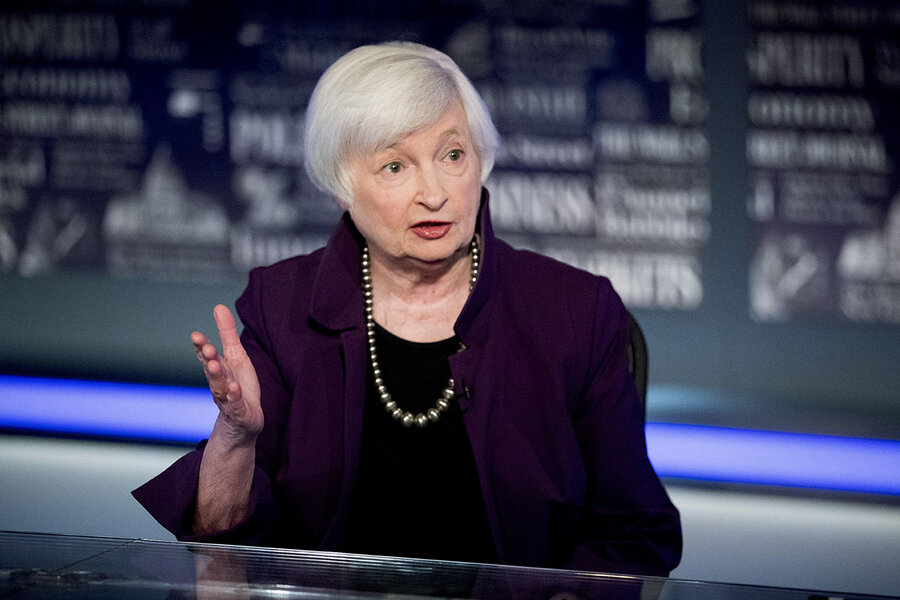Why Yellen is pushing a global corporate minimum income tax
Loading...
| Washington
United States Treasury Secretary Janet Yellen on Monday urged the adoption of a minimum global corporate income tax, an effort to at least partially offset any disadvantages that might arise from the Biden administration’s proposed increase in the U.S. corporate tax rate.
Citing a “30-year race to the bottom” in which countries have slashed corporate tax rates in an effort to attract multinational businesses, Ms. Yellen said the Biden administration would work with other advanced economies in the Group of 20 to set a minimum.
“Competitiveness is about more than how U.S.-headquartered companies fare against other companies in global merger and acquisition bids,” Ms. Yellen said in a virtual speech to the Chicago Council on Global Affairs. “It is about making sure that governments have stable tax systems that raise sufficient revenue to invest in essential public goods.”
The speech was Ms. Yellen’s highest-profile so far on international affairs, and came just as the spring meetings of the World Bank and International Monetary Fund began in a virtual format.
“It is important to work with other countries to end the pressures of tax competition and corporate tax base erosion,” Ms. Yellen said.
President Joe Biden has proposed hiking the U.S. corporate tax rate to 28% from 21%, partially undoing the Trump administration’s cut from 35% in its 2017 tax legislation. Mr. Biden also wants to set a minimum U.S. tax on overseas corporate income, and to make it harder for companies to shift earnings offshore. The increase would help pay for the White House’s ambitious $2.3 trillion infrastructure proposal.
Ms. Yellen’s remarks essentially serve as an endorsement of negotiations that have been underway at the 37-nation Organization for Economic Cooperation and Development for roughly two years, said Alan Auerbach, an economist at the University of California at Berkeley.
Mr. Biden’s U.S. corporate tax proposal includes an increase to the U.S. minimum tax that was included in Mr. Trump’s tax law, from 10.5% to 21%. One focus of the OECD talks is whether other countries will adopt similar minimums. Mr. Biden’s corporate tax measure would also penalize other countries without a minimum corporate tax by more heavily taxing their subsidiaries in the U.S.
Mr. Auerbach said that the OECD has helped foster other agreements around issues such as bank secrecy.
“There is precedent for this sort of thing,” Mr. Auerbach said. “But this would be a big deal because it would get countries to coordinate their tax systems in ways they haven’t before.”
Also on Monday, Mr. Biden said he is “not at all” concerned that a higher corporate tax rate would cause some U.S. companies to relocate overseas, though Ms. Yellen’s proposed global minimum corporate tax is intended to prevent that from happening.
“There’s no evidence to that ... that’s bizarre,” Mr. Biden said in response to a question from reporters.
According to the Tax Foundation, a right-leaning think tank, the Trump administration’s corporate tax reduction lowered the U.S. rate from the highest among the OECD countries to the 13th highest. Many analysts have argued, however, that few large U.S. multinationals paid the full tax.
“We have 51 or 52 corporations from the Fortune 500 who haven’t paid a single penny a day for three years?” Mr. Biden said. “Come on.”
Sen. Pat Toomey, R-Penn., said that Ms. Yellen’s proposal was unlikely to make much progress overseas. He also said Republicans should reverse any corporate tax hike if they regain a congressional majority in upcoming elections.
“Spoiler alert: This effort will likely fail and even if there is some sort of agreement, it will be non-binding because it is not a treaty,” Mr. Toomey said.
Ms. Yellen, meanwhile, downplayed the potential for the Biden administration’s domestic agenda, which also includes a $1.9 trillion COVID-19 relief package approved last month, to spur higher inflation. Former Treasury Secretary Larry Summers, among others, has raised such concerns since the relief bill passed.
“I strongly doubt that it’s going to cause inflationary pressures,” Ms. Yellen said, referring to the administration’s infrastructure proposal. “The problem for a very long time has been inflation that’s too low, not inflation that’s too high.”
Ms. Yellen also said the U.S. will step up its efforts at home and overseas to fight climate change, “after sitting on the sidelines for four years.”
Treasury will work to “promote the flow of capital toward climate-aligned investments and away from carbon-intensive investments,” Ms. Yellen said. That approach has raised the ire of GOP members of Congress, who say it threatens the ability of the U.S. oil and gas industry to access needed lending.
Ms. Yellen also noted that many developing nations are lagging in vaccinating their populations, and have also experienced harsh economic consequences from the pandemic. As many as 150 million people worldwide will fall into extreme poverty this year, Ms. Yellen said.
“The result will likely be a deeper and longer-lasting crisis, with mounting problems of indebtedness, more entrenched poverty, and growing inequality,” Ms. Yellen said.
The Biden administration supports the creation of $650 billion in new lending capacity at the IMF to address such issues, she said. Many Republicans in Congress oppose the new allotment, arguing that much of the funding would flow to relatively better-off developing countries, such as China.
Ms. Yellen acknowledged that the additional credit would be distributed to each IMF member, but argued that “significant resources will go to the poorest countries most in need.” Nations can also donate some of their funds to the hardest-hit countries, which she expects many will do, she added.
This story was reported by The Associated Press.







